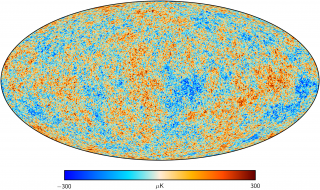Bibcode
Padilla-Torres, Carmen Pilar; Gutiérrez, Carlos M.; Rebolo, Rafael; Génova-Santos, Ricardo; Rubiño-Martin, J. A.
Referencia bibliográfica
Monthly Notices of the Royal Astronomical Society, Volume 396, Issue 1, pp. 53-60.
Fecha de publicación:
6
2009
Número de citas
9
Número de citas referidas
9
Descripción
We study the spatial distribution and colours of galaxies within the
region covered by the cold spot in the cosmic microwave background
recently detected by the Very Small Array interpherometer (VSA) towards
the Corona Borealis supercluster (CrB-SC). The spot is in the northern
part of a region with a radius ~1° (~5Mpc at the redshift of CrB-SC)
enclosing the clusters Abell 2056, 2065, 2059 and 2073, and where the
density of galaxies, excluding the contribution from those clusters, is
approximately two times higher than the mean value in typical
intercluster regions of the CrB-SC. Two of such clusters (Abell 2056 and
2065) are members of the CrB-SC, while the other two are in the
background. This high-density intercluster region is quite
inhomogeneous, being the most remarkable feature a large concentration
of galaxies in a narrow filament running from Abell 2065 with a length
of ~35 arcmin (~3Mpc at the redshift of CrB-SC) in the SW-NE direction.
This intercluster population of galaxies probably results from the
interaction of clusters Abell 2065 and 2056. The area subtended by the
VSA cold spot shows an excess of faint (21 < r < 22) and red (1.1
< r - i < 1.3) galaxies as compared with typical values within the
CrB-SC intercluster regions. This overdensity of galaxies shows a radial
dependence and extends out to ~15 arcmin. This could be the signature of
a previously unnoted cluster in the background.
Proyectos relacionados

Anisotropía del Fondo Cósmico de Microondas
El objetivo general de este proyecto es determinar y estudiar las variaciones espaciales y espectrales en la temperatura del Fondo Cósmico de Microondas y en su Polarización en un amplio rango de escalas angulares que van desde pocos minutos de arco hasta varios grados. Las fluctuaciones primordiales en la densidad de materia, que dieron origen a
Rafael
Rebolo López